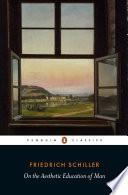Quotes from book
On the Aesthetic Education of Man

On the Aesthetic Education of Man is a treatise by the German author Friedrich Schiller in the form of a collection of letters. It deals with Immanuel Kant's transcendental aesthetics and the events of the French Revolution.

Letter 8; Variant: They would need to be already wise, in order to love wisdom.
On the Aesthetic Education of Man (1794)
Context: They have founded the whole structure of their happiness on these very illusions, which ought to be combated and dissipated by the light of knowledge, and they would think they were paying too dearly for a truth which begins by robbing them of all that has value in their sight. It would be necessary that they should be already sages to love wisdom: a truth that was felt at once by him to whom philosophy owes its name.

Letter 8; Variant: The greater part of men are much too exhausted and enervated by their struggle with want to be able to engage in a new and severe contest with error. Satisfied if they themselves can escape from the hard labour of thought, they willingly abandon to others the guardianship of their thoughts.
On the Aesthetic Education of Man (1794)
Context: Dare to be wise! Energy and spirit is needed to overcome the obstacles which indolence of nature as well as cowardice of heart oppose to our instruction. It is not without significance that the old myth makes the goddess of Wisdom emerge fully armed from the head of Jupiter; for her very first function is warlike. Even in her birth she has to maintain a hard struggle with the senses, which do not want to be dragged from their sweet repose. The greater part of humanity is too much harassed and fatigued by the struggle with want, to rally itself for a new and sterner struggle with error. Content if they themselves escape the hard labor of thought, men gladly resign to others the guardianship of their ideas, and if it happens that higher needs are stirred in them, they embrace with a eager faith the formulas which State and priesthood hold in readiness for such an occasion.

Letter 2 Variant translation of a passage: Utility is the great idol of the age, to which all powers must do service and all talents swear allegiance.
On the Aesthetic Education of Man (1794)
Context: The voice of our age seems by no means favorable to art, at all events to that kind of art to which my inquiry is directed. The course of events has given a direction to the genius of the time that threatens to remove it continually further from the ideal of art. For art has to leave reality, it has to raise itself bodily above necessity and neediness; for art is the daughter of freedom, and it requires its prescriptions and rules to be furnished by the necessity of spirits and not by that of matter. But in our day it is necessity, neediness, that prevails, and bends a degraded humanity under its iron yoke. Utility is the great idol of the time, to which all powers do homage and all subjects are subservient. In this great balance of utility, the spiritual service of art has no weight, and, deprived of all encouragement, it vanishes from the noisy Vanity Fair of our time. The very spirit of philosophical inquiry itself robs the imagination of one promise after another, and the frontiers of art are narrowed, in proportion as the limits of science are enlarged.

Letter 8; Variant: The greater part of men are much too exhausted and enervated by their struggle with want to be able to engage in a new and severe contest with error. Satisfied if they themselves can escape from the hard labour of thought, they willingly abandon to others the guardianship of their thoughts.
On the Aesthetic Education of Man (1794)
Context: Dare to be wise! Energy and spirit is needed to overcome the obstacles which indolence of nature as well as cowardice of heart oppose to our instruction. It is not without significance that the old myth makes the goddess of Wisdom emerge fully armed from the head of Jupiter; for her very first function is warlike. Even in her birth she has to maintain a hard struggle with the senses, which do not want to be dragged from their sweet repose. The greater part of humanity is too much harassed and fatigued by the struggle with want, to rally itself for a new and sterner struggle with error. Content if they themselves escape the hard labor of thought, men gladly resign to others the guardianship of their ideas, and if it happens that higher needs are stirred in them, they embrace with a eager faith the formulas which State and priesthood hold in readiness for such an occasion.